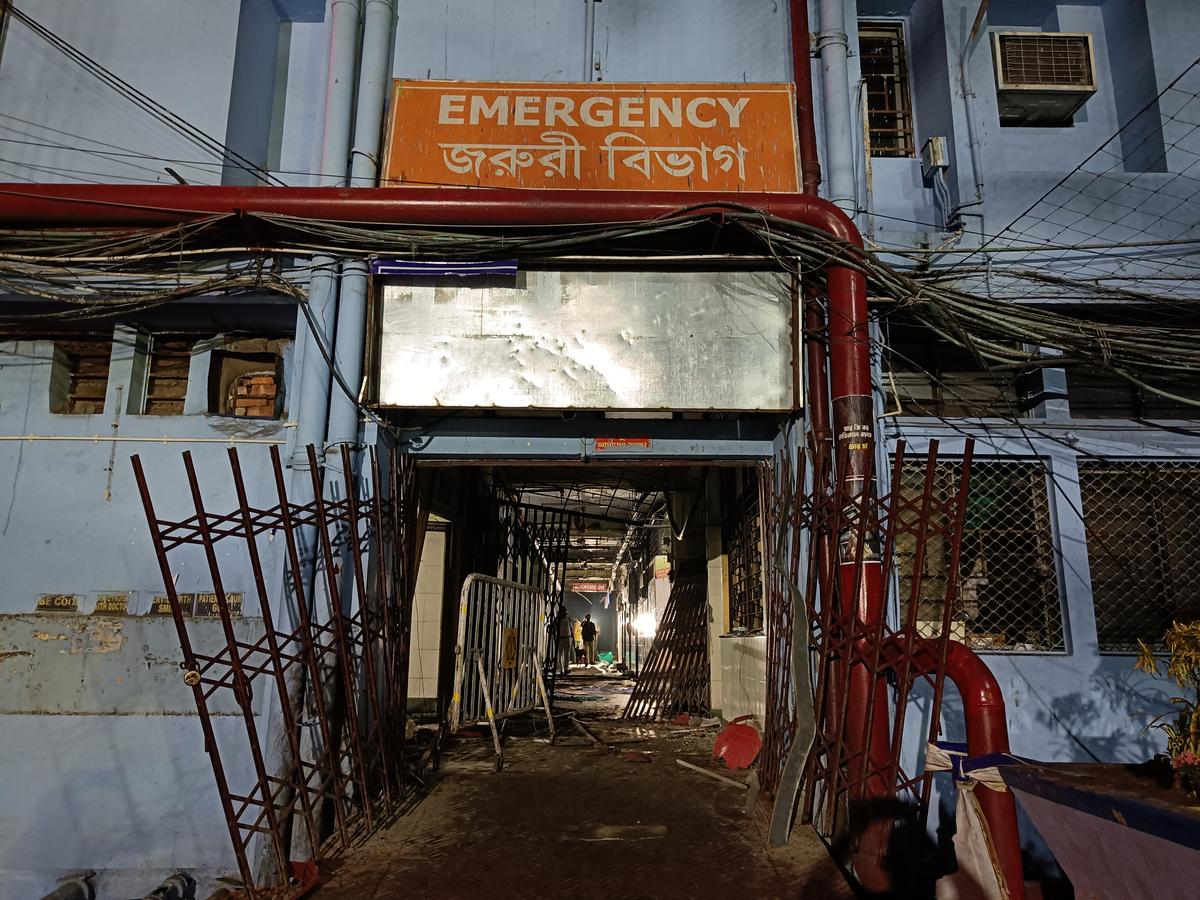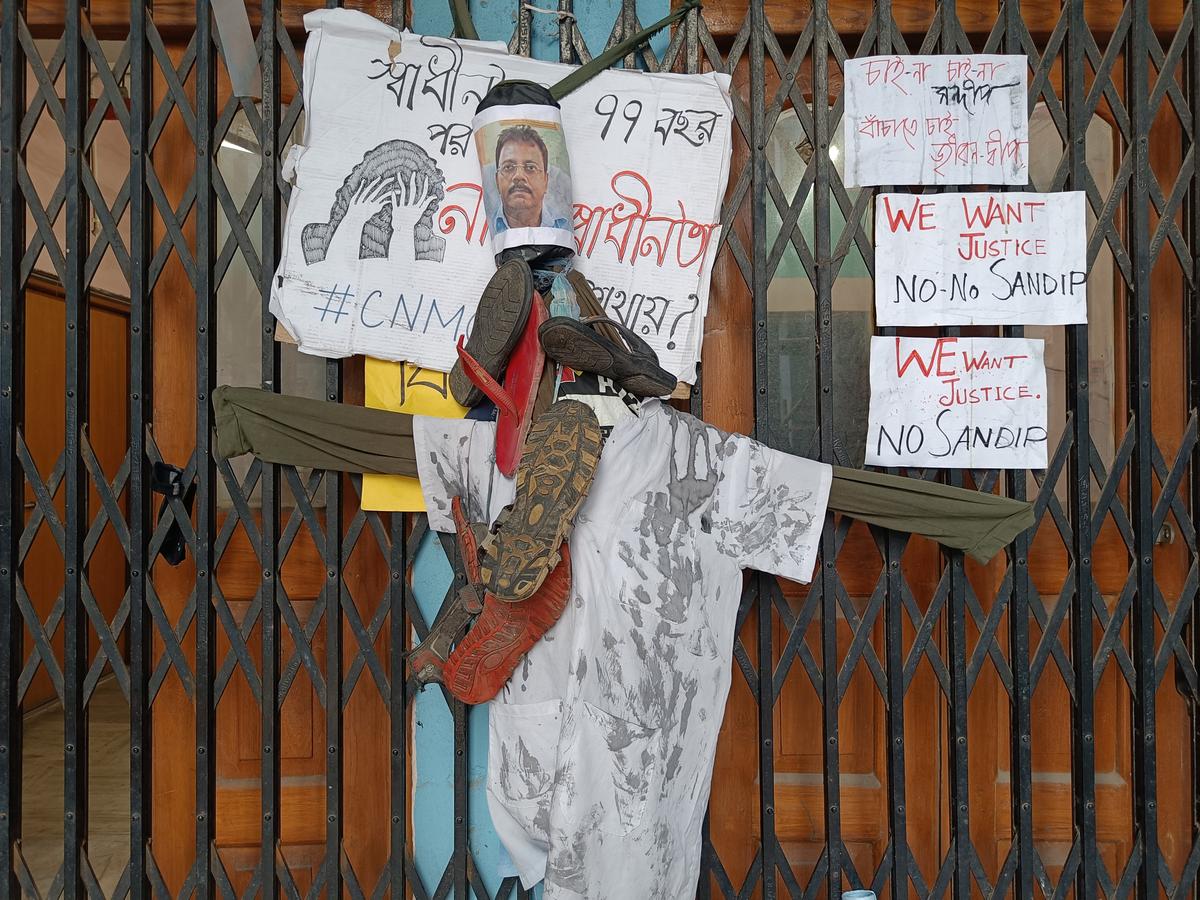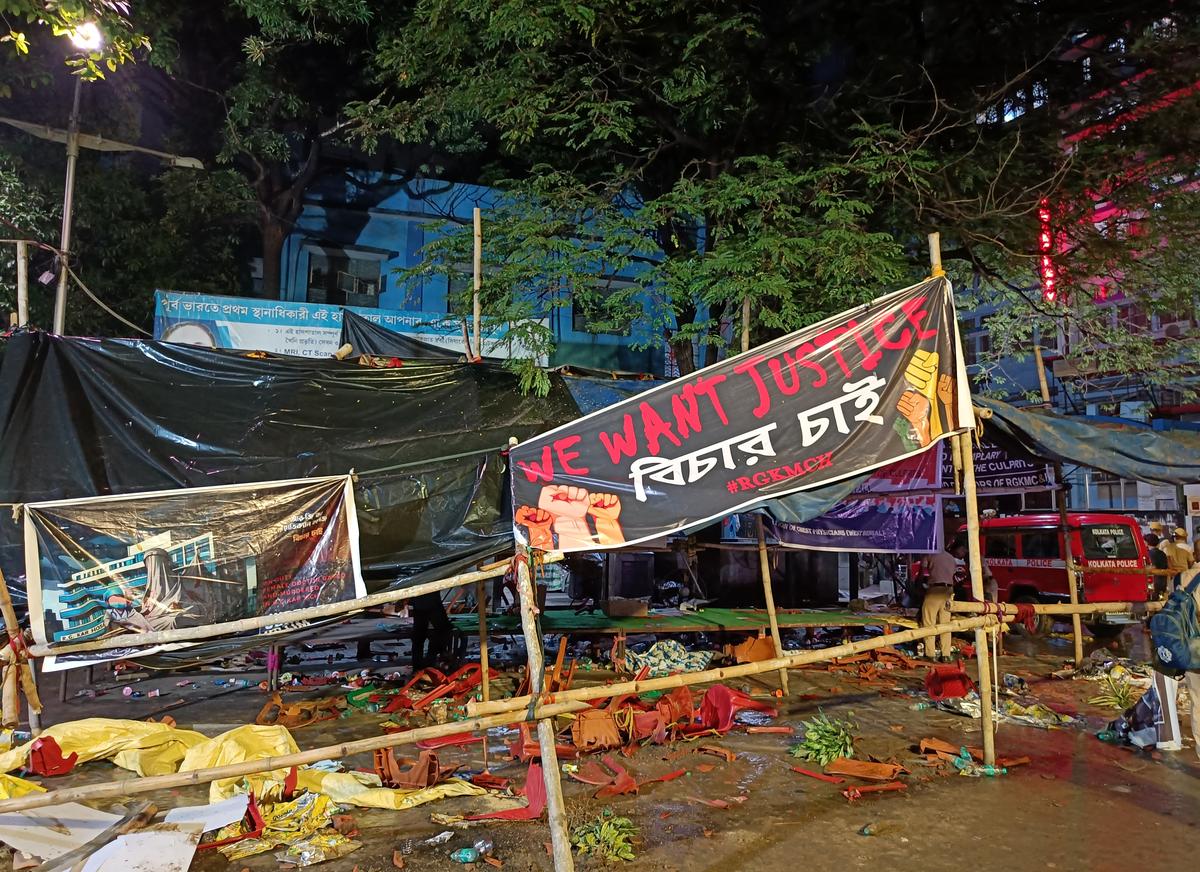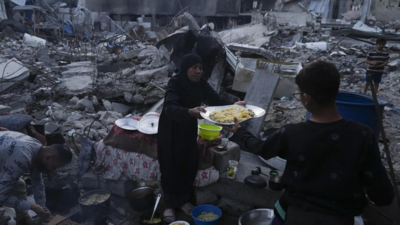Trigger warning: This article has disturbing details about rape and murder.
At the stroke of the midnight hour, on the eve of India’s 78th Independence Day, tens of thousands of women gathered across the streets of the country. With anger that bubbles up only after a ferment, they protested the brutal rape and murder of a trainee doctor in Kolkata’s state-run R.G. Kar Medical College and Hospital a week earlier. This mass outrage was not just about the crime, but also about the larger lack of safety of women and doctors across India, where there are more than 80 rapes every day on average, as per the National Crime Records Bureau (2022). A common refrain was: “What freedom do Indian women really have?”
On August 14, WhatsApp was flooded with messages calling women to gather at midnight across different cities. The protesters marched to chants of ‘Reclaim the Night’, a reference to the fact that the 31-year-old doctor was attacked in the middle of the night while she was taking a break from duty, and also to the 1970s movement, where women occupied public spaces at night, marching against sexual violence and for gender equality. At least 50 protest marches have been held since the incident on August 9.
Doctors protest at R.G. Kar Medical College and Hospital against the rape and murder of a female doctor.
| Photo Credit:
Debasish Bhaduri
For many, the mass demonstrations were reminiscent of 2012. Then too, a young woman who had stepped out at night was raped and murdered in New Delhi. Then too, thousands took to the streets demanding justice for the victim, as well as safe public spaces.
“The ‘Nirbhaya’ incident (as the rape and murder in Delhi is often referred to) occurred 12 years ago,” said Indrani Banerjee, a social worker. Wearing a T-shirt with ‘Feminist’ inscribed in bold letters, she was protesting at Kolkata’s Jadavpur area. “Has anything changed since then?”
Going on the rampage
That night, hundreds of people, including doctors, gathered outside the R.G. Kar Medical College and Hospital too, in peaceful protest. However, a few minutes past midnight, mayhem broke out. A mob of about 100 people tore through the police barricades erected outside and chased away doctors who were about to join the midnight march.
Kolkata_protests_19_arrested-66bf147a6691612b251fcb1a_Aug_16_2024_10_38_29.mp4
| Video Credit:
The Hindu
According to witnesses, the mob comprised intoxicated young men, who went on the rampage. They smashed medical equipment including ventilators, broke hospital beds, and tore posters demanding justice for the victim, which had been put up on the gate of the emergency wing. It was in the seminar hall on the fourth floor of the same building that the trainee doctor had been sexually assaulted and killed on August 9.
Terrified health workers, protesters, and journalists scrambled for safety. A second-year postgraduate trainee doctor said he ran into an auditorium with many others. They stacked up heavy furniture against the door of the room to prevent the mob from barging in.

The gate of the emergency building of the R.G. Kar Medical College and Hospital, which was forced open by the mob.
| Photo Credit:
Shrabana Chatterjee
“When the mob entered the premises, we ran for our lives,” he recalled. “We were unable to contact many of our friends. Those men did not spare patients or doctors; they beat everybody up. We didn’t recognise any of them.”
As chaos ensued, a person in the crowd shouted at the female doctors gathered there” “The girls should return to their hostels immediately. It is dangerous out here.”
Outside the hospital, the police used tear gas shells to disperse the mob, much like in 2012. Several police personnel were injured in the clash. The pungent smell of tear gas lingered in the air around the hospital as the mob tried to regroup at several key intersections of R.G. Kar Road.
The situation was defused a couple of hours later when the Kolkata Commissioner of Police, Vineet Kumar Goyal, arrived with a large contingent of police and Rapid Action Force personnel. “What has happened here is because of a malicious media campaign against the Kolkata Police,” Goyal alleged.
Hours after the incident, the Kolkata Police took to social media and claimed that the scene of crime had not been tampered with. “Don’t spread fake news. We will take legal action,” the police handle posted on X. This sparked more anger on social media. One user posted, “Find the rapists, murderers and the goons and take legal action (rather) than issuing threats online.”
No room to rest
On August 9, after a gruelling 36 hours of duty, the female doctor, a second-year postgraduate trainee in the chest department of R.G. Kar Medical College and Hospital, had gone to the seminar hall at about 2 a.m. to take a break, said the former principal of the hospital, Dr. Sandip Kumar Ghosh. Many departments do not have designated on-duty rooms for doctors to rest after long hours of work, several doctors said. This leaves them with no choice but to sleep in patient beds, waiting rooms, or, as in this case, empty halls.
The previous night, the trainee doctor had spoken to her parents on the phone. “She was in good spirits as usual,” they said.
On the morning of August 9, her semi-naked body was found on a blue mattress in the seminar hall. It bore multiple injuries and signs of sexual assault and torture.
At 10.53 a.m., the victim’s parents received a call from an assistant superintendent informing them that their daughter was unwell.
“My wife started crying inconsolably. She suspected that something grave had happened to our daughter,” the victim’s father said.
After an agonising wait, they received another call 22 minutes later, again from the same person. The caller claimed that the trainee doctor had died by suicide within the hospital premises. The shocked parents rushed to the hospital.
Kolkata police officials visit R.G. Kar Medical College and Hospital on August 9.
| Photo Credit:
Debasish Bhaduri
The inquest report, which was prepared at 4.40 p.m. on August 10, at the direction of the Additional Chief Judicial Magistrate, Sealdah, revealed gruesome details of the incident. It pointed to 10 injuries on the victim’s body including bleeding from the vagina, both eyes, and mouth; and injuries on the face, neck, nails, right hand, left leg, and stomach.
In their petition to the Calcutta High Court demanding a probe by the Central Bureau of Investigation (CBI), the parents said that they were not allowed to see their daughter’s body for three hours and alleged that the delay was intentional.
While speaking at a press conference on August 9, Dr. Ghosh revealed the identity of the victim, which is prohibited by law. To the protesting doctors, he said, “It was irresponsible of the girl to go to the seminar hall alone at night.”

An effigy of the former principal of R.G. Kar Hospital, Sandip Kumar Ghosh, by students of National Medical College. They locked the administrative building to stop him from taking over duty at their college after he resigned from R.G. Kar Medical College and Hospital.
| Photo Credit:
Shrabana Chatterjee
His comments sparked outrage. Under mounting pressure from the protesting doctors, Dr. Ghosh resigned from the hospital on August 12. However, hours later, he was reappointed as the principal of the National Medical College and Hospital, Kolkata.
Soon after the incident, the hospital administration allegedly started renovating the building where the rape and murder had occurred. Allegations that there were attempts to cover up the crime gained ground.
In its August 13 order, a division bench of the High Court noted that it was disturbing that a case of unnatural death had been registered by the police on August 9 at the Tala Police Station. Despite the victim being a trainee doctor, the principal or the hospital had not lodged a formal complaint with the police, the court observed. “This, in our view, was a serious lapse, giving room for suspicion,” it noted.
On August 16, the High Court rapped the State government and asked what the urgency was in reassigning a new posting to the principal, who has been accused of several lapses. The Court directed that Dr. Ghosh be sent on leave and not be appointed as principal of any other medical college and hospital. The Court also asked the State government about the renovation at the hospital. The State government’s counsel told the Court that allegations that the place where the incident took place was demolished were incorrect.
The accused, a civic police volunteer
Within 12 hours of the crime, the Kolkata Police arrested Sanjoy Roy, 35, a civic police volunteer since 2019. Roy was active with the Police Welfare Association. He lived in the barracks of the Calcutta Police’s 4th battalion and used a motorbike marked ‘police’. He had “no business” to be in the seminar hall that night, the police said. Roy was arrested and later handed over to the CBI.
The Mamata Banerjee-led government began appointing civic police volunteers about 10 years ago, to assist the police. Civic police volunteers are expected to have studied at least until Class VIII. They are paid ₹9,000 a month. Over the years, the force has been growing.
“Civic police volunteers have helped the Trinamool Congress (the party in power) get more footing in the Bengal regime. There is no permanent work, only contractual, so they remain loyal to the ruling party. There is no proper process for appointment. No norms are followed. That is why the party can appoint their own cadre. The party also uses the civic volunteers to conduct election work,” said Biswanath Chakraborty, a professor of political science at Rabindra Bharati University, Kolkata.
The strength of the Kolkata Police is 37,000. Of them, 7,200 are civic police personnel. The police have been hesitant to admit that the accused had any association with the force. When asked about the job profile of the accused, the Kolkata Police Commissioner merely said, “To us, he is a criminal of the highest order”.
Even after the arrest of Roy, there has been widespread speculation that multiple people may have been involved in the crime given the horrific nature and extent of the victim’s injuries.
People began sharing the names of doctors of the R.G. Kar Medical College and Hospital as some of the other accused, online. Soon, misinformation was rife. The family of a medical intern from a village in West Bengal was forced to lodge a police complaint when his name began doing the rounds as an accused person.

“Rumours are being floated that someone is associated with the crime. He is an intern and comes from a small place… This is pathetic. I cannot on the basis of some rumours arrest an intern. It is against my conscience,” said Goyal. He added that the police never said that there was only one person involved in the crime. Scientific evidence requires time, he added.
Misinformation is not the only problem online. Many doctors have been sharing photos and videos of the victim on social media, which is also in violation of the law.
‘This could have been me’
Since August 9, postgraduate trainee doctors everywhere have decided to stop work and seek justice for the victim and security for doctors in hospitals. Medical services across several hospitals in West Bengal have been severely affected. Despite pleas from the State government, the trainee doctors have refused to resume work.
Doctors under the auspices of the Mangaluru branch of the Indian Medical Association stage a candle light march and protest in Mangaluru on August 13 to condemn the rape and murder of a medical student while on duty in Kolkata.
| Photo Credit:
H.S. Manjunath
On average, nearly 2 lakh patients visit the out-patient departments (OPD) and 12,000 patients are admitted every day in State-run hospitals in West Bengal. R.G. Kar Hospital, which has about 1,600 beds, treats over 3,600 patients in the OPD every day. It admits 245 patients daily. In certain parts of the State, people have been losing patience with the disruption of medical services and have started holding demonstrations outside State-run health facilities. With the postgraduate trainee doctors on strike, the State is finding it difficult to keep hospitals functional.
The anger of medical personnel is not confined to Kolkata. The Indian Medical Association, the largest organisation of medical staff in the country, has announced a nationwide strike from August 17 to August 18. Most hospital departments will be closed in both public and private hospitals on that day, it said. Only essential services will remain operational.
Far away from the protests, in the suburbs of Kolkata, journalists have been flocking to a quiet neighbourhood. A memorial with the photograph of the victim with her face blurred and name scratched out has come up near her house.
“If we take any compensation from the government, our daughter will not get peace,” the victim’s father said. The victim’s mother believes that the mob attack at the hospital on August 14-15 was an “attempt to destroy evidence.”
Banerjee visited the victim’s house on August 12 and demanded the death penalty for the culprits. The Chief Minister had made controversial statements following earlier incidents of rape. In 2012, she called the rape of a woman in the bustling Park Street in Kolkata “a staged incident”. In 2013, when protests broke out against the abduction, gang rape, and murder of a college student in Kamduni, she described the protesters as “Maoists”. This time, Banerjee assured the family that the case will be handed over to the CBI if the Kolkata Police fails to crack it. On August 13, the High Court transferred the case to the CBI.
However, on August 14, when protests started gathering momentum and women called for a march to ‘reclaim the night’, Banerjee saw it as a ploy to remove her from power, similar to what she said had unfolded in neighbouring Bangladesh. When the mob ransacked the hospital, she said that “Baam and Ram (the Left and the Bharatiya Janata Party)” had joined hands to do this.
Banerjee holds the portfolio of both the Home and Health Ministries. This is the first time in her 13-year-long regime as Chief Minister that the Opposition has demanded in one voice that she resign.
At the time when the Chief Minister was meeting family members of the victims, a number of women postgraduate trainee doctors sat in protest at R.G. Kar Medical College and Hospital.

The protest podium at the heart of R.G. Kar Medical College and Hospitalwhere students sat tirelessly for over a week seeking justice for the trainee doctor who was raped and murdered in the seminar hall of the hospital.
| Photo Credit:
Shrabana Chatterjee
A first-year postgraduate trainee doctor from Rajasthan said, “Such violence against women is common in my State. My parents and I thought Kolkata would be a better option for me since it is often said that this is a safe city for women. That belief has now completely vanished.” When crime records for 2022 came out earlier this year, Kolkata was declared the safest city for women.

“My parents are asking me to return home,” said a postgraduate trainee doctor in chest medicine, who had graduated with an MBBS degree from Madras Medical College, Chennai. “They are saying an MBBS is enough, and I should not risk my life for a postgraduate degree.”
The trainee doctors said they worked hard to clear the National Eligibility-cum-Entrance Test (NEET) and are now forced to slog for a low salary. “It takes a year to prepare for NEET after we get our degrees. We get paid ₹50,000 a month for long hours of work in horrible conditions,” said a first-year postgraduate trainee doctor.
A teary-eyed second year postgraduate trainee doctor who was working that night in the same hospital in a different building heard about the incident after completing 30 hours of duty. “It could have been me, instead of her,” she said, her voice shaking.







![Best Weight Loss Supplements [2022-23] New Reports!](https://technologytangle.com/wp-content/uploads/2022/12/p1-1170962-1670840878.png)




